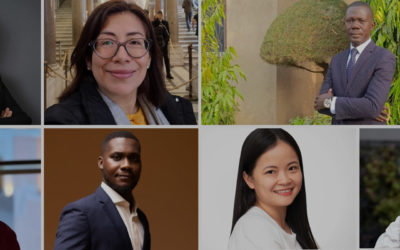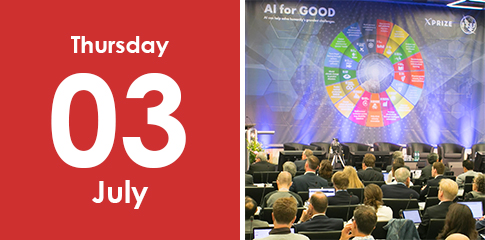Key recommendations from the GHFutures2030 Report
Digital and data-driven tools are fundamentally changing approaches to health and the design of health systems; however, governance models have not followed the rapid pace of innovation. The Lancet and Financial Times Commission on Governing health futures 2030: Growing up in a digital world (‘the Commission’ or ‘GHFutures2030’) was established in 2019 to explore the convergence of digital health, artificial intelligence (AI), and other frontier technologies with universal health coverage (UHC) to support the attainment of the third Sustainable Development Goal: “ensure healthy lives and promote wellbeing for all at all ages”.
The Commission report was launched at the World Health Summit in Berlin on 25 October 2021. The hybrid launch event convened policymakers, government leaders, academics, researchers, private sector, and youth—all of whom have a key stake in health futures and the roles that data, AI, and digital technologies play in shaping our health futures.
The Commission is composed of two co-chairs and 17 Commissioners representing a wide range of sectors, expertise and backgrounds. Through its report, the Commission aims to outline the governance approaches and initiatives that are required to shape health futures and transform UHC in an age of increasing digital transformations.
The report focuses on the digital transformations of health and the health futures of children and young people growing up in a digital world who stand to inherit models designed (or neglected) in the current digitally & data driven world. Moreover, it examines integrative policies in development worldwide to identify those with the greatest potential to improve health and wellbeing of all ages—children and young people in particular—to promote health equity, human rights, and data solidarity in a digital world.
Growing up in a digital world
Children and young people are growing up amidst radical digital transformations, rapidly changing information ecosystems, widespread integration of digital technologies, and socio-politico-environmental shifts. Yet, despite such substantial and wide-reaching changes in all sectors (particularly in health), there remain large gaps in our understanding of the impacts of digital technologies on the health and wellbeing of young people. Being the most active users of digital technology and digital media, they stand to gain—or lose—the most from the digital transformations in all domains, including health.
The changes brought about over the past few years have made society increasingly aware of just how dependent we are on digital technologies. Moreover, they have shown us how—when used for greater public good—digital technologies and data can help us respond to health challenges. Such changes have also made us more cognisant of how digital transformations—or exclusion from them—can be detrimental to our health and our rights.
Without a precautionary, mission-oriented, and value-based approach to governance, digital transformations will fail to bring about improvements in health for all and will leave people behind in the process. Therefore, while the Commission argues that digital transformations should be considered as a key determinant of health, it also presses for a paradigm shift in how digital technologies are designed, implemented, and governed.
Meaningfully engaging youth in the governance of health futures
As such, to ensure that everyone benefits from digital transformations in health and healthcare, there is an urgent need to orient digital health priorities towards the establishment of strong health and wellbeing foundations early on in life. Given youth are a diverse demographic group, they require adaptive health services that are responsive to and reflective of their needs and priorities; these are likely to vary across age groups, communities, and levels of digital literacy. The Commission emphasises that a society’s ability to maximise the health and wellbeing of young people in an age of digital transformations is indicative of how it protects its most vulnerable groups and how it intends to leverage technologies and data for the benefit of the whole population.
Moving beyond tokenistic involvement, the Commission set a benchmark for putting children and young people at the centre of its work. The Commission carried out various consultations with diverse groups of youth to inform the recommendations and findings of its final report, regarding young people as experts in their own health and lived experiences. These consultations, also resulted in the co-creation of a standalone Youth Statement and Call for Action, which complements the report.
Key recommendations for sustainable health futures arising from the Commission’s report
In its report, the Commission emphasises that the governance of digital technologies in health and health care must employ a value-based framework for governing health futures that places public purpose ahead of private profit. To positively shape health futures in a digital world, governance approaches should be grounded in Health for All values of democracy, equity, solidarity, inclusion, and human rights. Moreover, policymakers must address the power asymmetries reinforced by digital transformations, increase public trust in the digital health ecosystem, and ensure that opportunities afforded by digital technologies and data are harnessed in support of the missions of public health and UHC.
The Commission shares four key action areas to enact the above:
- Decision makers, health professionals, and researchers should consider—and address—digital technologies as increasingly important determinants of health.
- There is a need to build a governance architecture that creates trust in digital health by enfranchising patients and vulnerable groups, ensuring health and digital rights, and regulating powerful players in the digital health ecosystem.
- A new data solidarity-based approach is needed with respect to how health data is collected and used, one which simultaneously protects individual rights, promotes the potential public good that can arise from using health data, and fosters a culture of data justice and equity.
- Decision makers are urged to invest in the enablers of digitally transformed health systems; this requires strong country ownership of digital health strategies and clear investment roadmaps which prioritise technologies that are most vital at different levels of digital health maturity.
Key Links
- GHFutures2030 website
- The Commission hub on The Lancet website
- The Commission Report
- Youth Comment
- Youth Statement and Call for Action
- Recording of the Commission report launch at the World Health Summit
Brian Li Han Wong, Global Health Alumni
Youth Officer, The Lancet & Financial Times Commission
Governing health futures 2030: Growing up in a digital world
brian.wong@graduateinstitute.ch









0 Comments